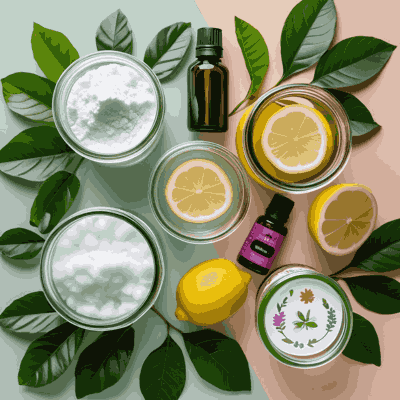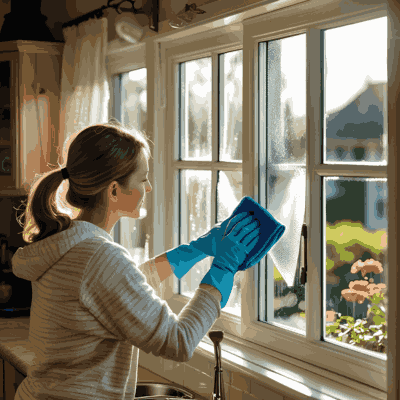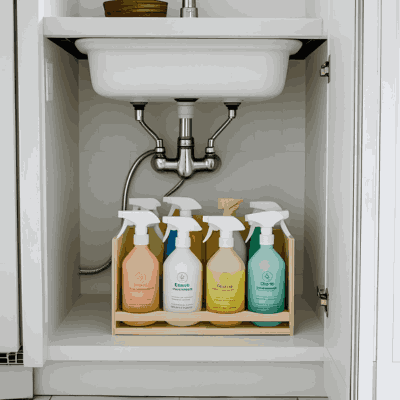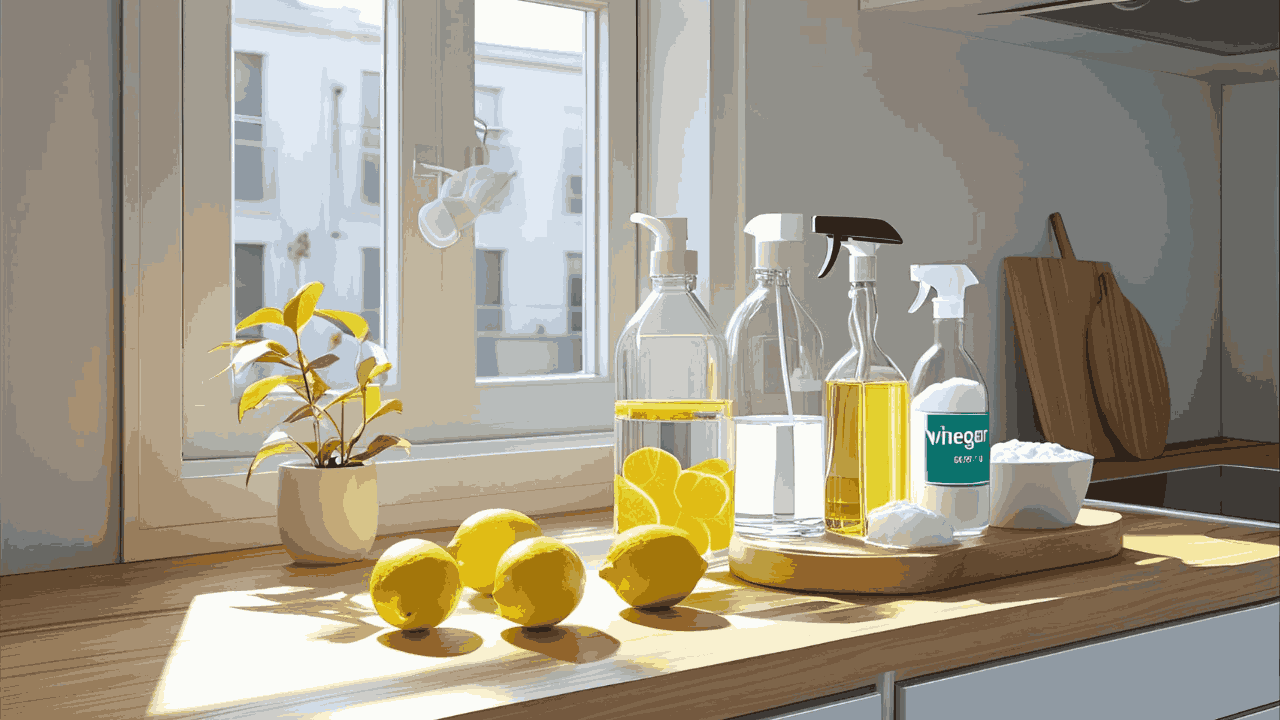Keeping your apartment clean doesn’t have to mean using harsh chemicals. With DIY natural cleaners for small homes, you can maintain a sparkling space using ingredients from your kitchen while protecting your health and the planet. Whether you’re in a studio or a compact flat, these homemade solutions are cost-effective, eco-friendly, and incredibly easy to make..
What is Zero-Waste Cleaning?
Zero-waste cleaning is a sustainable cleaning method that focuses on reducing trash, reusing materials, and avoiding harmful chemicals. Rather than relying on harsh store-bought products packaged in single-use plastics, zero-waste cleaning involves using natural, biodegradable ingredients and reusable tools to keep your home sparkling.
The aim is simple: create minimal waste while maximizing cleanliness.
DIY Natural Cleaners for Small Homes: Tiny Apartment Hacks

Living in a small space means every product you own takes up valuable room. Large bottles, excess packaging, and chemical fumes can become overwhelming. Here’s why zero-waste cleaning is perfect for compact homes:
- Less Storage Space: Small apartments often lack storage for bulky bottles and mops.
- Healthier Air Quality: Chemical cleaners release toxins that linger in tight spaces.
- Minimalist Living: Most tiny home dwellers prefer clean, simplified lifestyles — making zero-waste a natural fit.
- Environmentally Responsible: With fewer items and less waste, your carbon footprint shrinks significantly.
Your DIY Zero-Waste Cleaning Kit

Starting a zero-waste lifestyle doesn’t mean replacing everything at once. Start small with these essential items that serve multiple purposes:
- Glass Spray Bottles – Refill endlessly and avoid single-use plastic.
- White Vinegar – A disinfectant, deodorizer, and streak-free glass cleaner.
- Baking Soda – Acts as a scrub, odor neutralizer, and soft abrasive.
- Lemon Peels – Infuse vinegar for a citrusy scent or use to freshen sinks.
- Essential Oils – Add fragrance (like lavender or lemon) and antimicrobial benefits.
- Old T-Shirts or Rags – Replace paper towels with washable cloths.
- Castile Soap – A gentle, multipurpose soap for dishes, floors, and surfaces.
- Reusable Sponges and Scrubbers – Made of compostable coconut fibers or bamboo.
- Mason Jars – For storing your DIY recipes in a tidy, air-tight manner.
These DIY natural cleaners for small homes are perfect for people who want a low-waste lifestyle without sacrificing cleanliness.
3 Simple Zero-Waste Cleaning Recipes
Here are three powerful, chemical-free recipes that take just minutes to prepare:
1. All-Purpose Citrus Cleaner
- Ingredients: Peels from 2 lemons, 2 cups white vinegar, 1 glass jar, and 1 spray bottle.
- Instructions: Place peels in a jar, cover with vinegar, and let sit for 1–2 weeks. Strain into a spray bottle and use on counters, tiles, and glass.
2. Natural Scrub Paste
- Ingredients: ½ cup baking soda, 2 tablespoons water.
- Instructions: Mix into a paste and scrub away grime from sinks, stoves, or tubs. Rinse with warm water.
3. Eco Toilet Bombs
- Ingredients: 1 cup baking soda, ¼ cup citric acid, 10 drops essential oil.
- Instructions: Mix ingredients and form into balls or press into silicone molds. Let dry. Drop one into your toilet weekly to clean and deodorize.
- One of the best parts about DIY natural cleaners for small homes is how versatile baking soda and vinegar can be.
Smart Swaps That Reduce Waste
Make simple substitutions in your cleaning routine to eliminate disposable waste:
- Switch to compostable bamboo scrub brushes instead of plastic ones.
- Replace paper towels with reusable microfiber or cotton cloths.
- Buy ingredients like baking soda, vinegar, and citric acid in bulk or refillable stores.
- Avoid buying scented commercial cleaners; use natural essential oils instead.
- Use soap nuts or eco-laundry sheets for washing clothes.
These changes, while small, create a massive positive impact over time.
Storage Tips for Tiny Spaces

Even your zero-waste cleaning products need to be stored efficiently. Here are smart ways to stay organized:
- Vertical Baskets: Hang over-the-door caddies to store cloths, bottles, and brushes.
- Magnetic Racks: Use for spray bottles and metal scrubbers.
- Under-Sink Bins: Store jars and cloths in a tidy, labeled bin.
- Label Everything: Label DIY products with the recipe and date for easy use.
- Minimal Tools: Stick to one of each item (one bottle, one rag per room) to prevent clutter.
Zero-Waste Cleaning Habits for Small Home
How does this look in real life? Here’s how to apply zero-waste hacks to daily tasks:
- Kitchen: Clean counters with citrus spray. Use a cloth napkin for drying dishes. Sprinkle baking soda on greasy pans.
- Bathroom: Use the toilet bomb weekly. Scrub the sink with the paste. Clean mirrors with diluted vinegar.
- Floors: Add a few drops of Castile soap to a bucket of water. Use a washable mop head or towel.
- Windows: Use a vinegar-water mix and old newspaper or cloths for a streak-free shine.
Health Benefits of Natural Cleaning
Not only are these methods planet-friendly, but they’re also people-friendly:
- No harsh fumes: Better indoor air quality means fewer headaches and asthma triggers.
- Non-toxic surfaces: Safer for babies, pets, and sensitive skin.
- Allergy-friendly: Essential oils (when chosen carefully) can reduce dust mites and bacteria.
- Better skin: Avoid skin irritation from bleach or ammonia-based products.
Saving Money with Zero-Waste Cleaning
Here’s how your wallet benefits too:
- Fewer products to buy: A handful of ingredients clean your entire home.
- Reusable tools: No more buying new paper towels or plastic scrubbers.
- Make once, use often: DIY recipes last weeks or months.
- Bulk pricing: Buying vinegar or baking soda in bulk cuts cost per use.
In fact, most people can cut their cleaning expenses by 50–70% over the year by switching to DIY options.
Sustainability: More Than Just Cleaning
Choosing zero-waste cleaning is part of a broader lifestyle shift. It supports:
- Waste reduction: Fewer items going to landfills or recycling plants.
- Carbon footprint lowering: Less shipping, less plastic production.
- Minimalist living: Less clutter, more intentional home care.
- Community impact: Encourage neighbors and friends to do the same.
Final Thoughts

Zero-waste cleaning isn’t about perfection — it’s about intention. By choosing reusable, non-toxic, and natural alternatives, you’re not only creating a healthier home for yourself, but also helping reduce the global plastic and chemical burden.
Start with one swap. Then another. Over time, you’ll have a completely sustainable cleaning system that’s healthier for your body, your budget, and the planet.
By switching to DIY natural cleaners for small homes, you’re not just saving money — you’re reducing your footprint and creating a safer space for your family.
FAQs
Q1. Is zero-waste cleaning really effective?
Yes! Natural ingredients like vinegar and baking soda have been used for generations and are proven to remove dirt, grime, and odors effectively.
Q2. What if I don’t have access to bulk ingredients?
Start small with what you can find locally. Even using one reusable bottle or cloth is a great first step.
Q3. Is it safe for pets and kids?
Most DIY ingredients are safe, but be cautious with essential oils and always test recipes before use.
Q4. Does it take more time than regular cleaning?
Not really! Once your DIY recipes are made and tools are in place, it becomes just as convenient — and often more efficient.
Q5. How do I stay consistent with zero-waste cleaning?
Keep your supplies visible and easy to access. Schedule cleaning times, and reward yourself for sticking to your eco-goals.
DIY Natural Cleaners for Small Homes: 3-Ingredient Eco Tips – Vyriti
